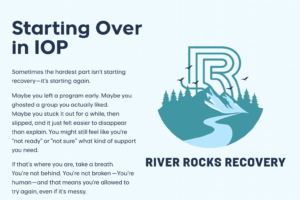Sometimes the hardest part isn’t starting recovery—it’s starting again.
Maybe you left a program early. Maybe you ghosted a group you actually liked. Maybe you stuck it out for a while, then slipped, and it just felt easier to disappear than explain. You might still feel like you’re “not ready” or “not sure” what kind of support you need.
If that’s where you are, take a breath. You’re not behind. You’re not broken. You’re human—and that means you’re allowed to try again, even if it’s messy.
At River Rocks Recovery’s IOP in Middletown, Ohio, we meet people in all kinds of places—not just at the so-called beginning. You don’t have to follow some perfect sequence to return to yourself. Recovery doesn’t have to happen in order for it to work.
Here’s how IOP fits into different paths—and why it might be the right re-entry point, whether you’ve never been to treatment or you’ve walked away before.
There’s No One “Right” Way to Do Recovery
You’ve probably seen recovery laid out like a staircase: detox, residential, IOP, outpatient therapy, aftercare. And for some, that sequence is a lifesaver. But for others? It doesn’t line up with their needs, timing, or real-life responsibilities.
Here’s what most treatment maps don’t show you: people step in and out at all kinds of points.
- Some start in IOP because they’re still working or parenting and can’t step away fully.
- Some return to IOP after leaving a higher level of care.
- Some cycle through phases—starting, stopping, restarting—not because they’re failing, but because they’re learning.
You don’t have to be “new to recovery” to qualify. And you don’t have to “do it right” the first time to come back.
What Is IOP—And What Makes It Different?
IOP stands for Intensive Outpatient Program. Think of it as the structured middle ground between residential treatment and weekly therapy.
At River Rocks Recovery, our IOP includes:
- Multiple evening sessions per week (usually 3–5 days, 3 hours per night)
- Clinical therapy groups focused on substance use, mental health, and coping
- Individual sessions as needed
- Evidence-based modalities, not just talk circles
- Flexible scheduling that works with jobs, caregiving, and daily life
But what really sets IOP apart isn’t just the format. It’s the emotional fit.
IOP is for people who are still navigating life while seeking change. It’s for the ones who ghosted a program but still want help. For the people who are done with crisis but still living close to the edge.
It’s structured enough to support real change, but flexible enough to let you keep living while you heal.

You Can Start in IOP—Even If You’ve Never Done Treatment Before
Some people assume they have to “work their way up” to IOP. That they have to go through detox, or inpatient, or some other step before they qualify.
Not true.
IOP is often the first point of care for people who are high-functioning but overwhelmed. You might be holding it together on the outside, but feeling increasingly untethered on the inside. You don’t need to wait for a crisis.
In fact, the earlier you seek support, the more options you have. Starting in IOP means you’re catching the pattern before it spirals. That’s a strength—not a shortcut.
You Can Return to IOP—Even If You Dropped Out Before
Let’s talk honestly.
You might’ve left a program without saying goodbye. You might’ve told yourself you’d come back and didn’t. You might’ve relapsed and felt too ashamed to reach out.
You are still allowed to return.
IOP is a place for people in progress—not perfection.
We don’t need you to explain everything. We just want to meet you where you are now. And if that means coming back through the same door you left—great. That takes courage, not guilt.
One client told us:
“The first time, I thought I had to say the right things. The second time, I just showed up as I was. That’s when it started to work.”
— IOP Client, 2023
You don’t need to earn your spot back. You already have it.
You Can Step Down to IOP After Higher Levels of Care
If you’ve completed residential, PHP, or detox, you might be wondering, What now?
That’s where IOP comes in.
It gives you structured support while you re-enter daily life. You’re not left on your own to “figure it out,” and you’re not thrown into open-ended therapy without a framework. IOP lets you stabilize while building new routines in real-time.
Many clients who step down into IOP tell us it’s where their recovery actually starts to stick—because it meets them where they’re living, not just where they were healing.
You Don’t Have to Be Sober Yet to Join IOP
This is another myth we hear a lot: “I can’t come back until I’ve been sober for at least a few days.”
Nope.
We don’t expect you to walk through the door with everything figured out. If you’re still using sometimes—or often—you can still benefit from IOP.
The question is: Are you ready to look at what’s going on? To be honest? To get support?
That’s the entry point—not your sobriety status.
If we ever feel like a different level of care would be safer, we’ll talk with you about that—not shut you out.
FAQ: What if I’ve already done IOP and it didn’t work?
We hear this one a lot. And it’s valid.
Sometimes IOP doesn’t land the first time. Maybe it wasn’t the right fit. Maybe you weren’t ready. Maybe life got in the way.
But doing something again with new insight can make all the difference.
This time around, maybe you’re clearer on what kind of support you need. Maybe you’re more willing to speak up. Maybe you just know yourself a little better now.
It’s not a repeat—it’s a return with more tools.
FAQ: How long do people usually stay in IOP?
Most IOP programs last 6 to 12 weeks, but it varies.
At River Rocks, we customize your plan based on your goals and needs. Some people stay longer for more support. Some step down sooner into individual therapy or alumni groups.
We’re not interested in checking boxes. We’re interested in what works for you.
FAQ: Is IOP enough if I’m really struggling?
In many cases, yes.
IOP is designed for people who need more than weekly therapy but don’t require 24/7 care. If you’re functioning during the day but unraveling at night—or if you’re overwhelmed, isolated, or in emotional free fall—IOP can be a safe and powerful next step.
That said, we’ll always help assess whether this level of care is right for you. And we’ll never shame you if another option is needed.
Location Support That Feels Close to Home
If you’re looking for IOP in Hamilton, Ohio or anywhere near Middletown, our local team understands the real-life pressure of living, working, and trying to heal in the same community. You won’t be treated like a stranger. You’ll be welcomed back like someone we were always holding space for.
You’re Not Too Late to Start Again
Recovery doesn’t follow a script. And you don’t need to rewind the story to a specific scene to continue it.
Whether you left treatment, got overwhelmed, or have no idea where to begin—I’m glad you’re still thinking about it. That means you’re still in it.
River Rocks Recovery’s IOP program in Middletown, Ohio is here for whenever you’re ready—whether that’s today, next week, or the next time you read something like this and feel that familiar tug in your chest.
Come as you are. Begin again.
Ready to take the next step?
Call (888) 905-6281 to learn more about our IOP services in Middletown, Ohio. We’ll meet you where you are.




























